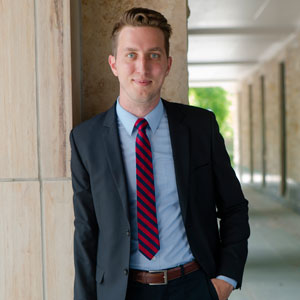Living the Call
April 26, 2017 | Alumni, Public

In this series, we asked alumni to update us on their path to ministry since graduation. They reflect on how their time at Princeton Seminary prepared them for leadership, while sharing some of the surprises and challenges they’ve experienced along the way.
Brendan Byers ’15 MDiv discusses his path to the Center for Faith-based and Community Initiatives in Washington DC, and shares how his time as a student equipped and invigorated him to pursue his passion for coalition building and interfaith work.
Q: Tell us about yourself. How did you end up where you are now?
A: Currently, I work for the U.S. Agency for International Development (USAID), specifically in the Center for Faith-based and Community Initiatives (CFBCI). I was able to do this thanks in large part to the opportunity Princeton Seminary afforded me. As a student I participated in the National Capital Semester for Seminarians (NCSS). This longstanding program provides seminarians the opportunity to study and engage their various religious traditions on the national and international levels in our nation’s capital.
I am grateful for the guidance and mentorship of my professors, especially Ellen Charry and Mark Taylor who helped me work through and learn to express my faith identity through politics for the betterment of others. Despite being the son of a former pastor, my vocational goals were never aimed at the parish, but instead toward what some call the “secular.” My faith expression has always been in coalition building and interfaith work. My professional aspirations have always been closely married to my faith, but in communities that may or may not be fluent in the dialect of religious leaders.
“I’ve found myself traveling the globe to better equip practitioners of all faiths overseas to better serve their communities. If you would have told me this five years ago, I would have laughed at the novelty and grandiosity of such a vision.”
Q: What does your current role involve?
A: At the USAID, I work as a special assistant in the Center for Faith-based and Community Initiatives, which serves to coordinate engagement with faith-based organizations (FBOs) and religious leaders in partnership with the U.S. government in international development. That can include disaster relief, humanitarian assistance, health services, reconciliation, and peacebuilding efforts, countering violent extremism and the incitement of violence, among a multitude of other things.
Our mandate is to serve both colleagues here at the USAID as well as those FBO partners we work with overseas. To the former, we stand to educate our staff in religious literacy both here in DC and overseas. We proactively connect FBOs with mission staff in the country to potentially scale up existing efforts and create new collaborative partnership opportunities.
Q: What has been the biggest challenge for you in your ministry? What has been the biggest surprise?
A: The biggest surprise has been where this crazy journey has taken me in just four years! Leaving college and landing in Brown Hall for my first semester at Princeton Seminary was unexpected. Initially, I had planned to go on to earn a PhD and teach religious history at a small liberal arts college in New England. Instead, I’ve found myself traveling the globe to better equip practitioners of all faiths overseas to better serve their communities. If you would have told me this five years ago, I would have laughed at the novelty and grandiosity of such a vision.
Q: Looking back, how do you think Princeton Seminary prepared you for the work you’re doing?
A: My coursework in the areas of interfaith dialogue, comparative religious studies, political activism, and the history of the church in the public sphere gave me a strong foundation to serve outside the parish with faith-based organizations and religious leaders. The further I broadened the scope of my study, the more diverse I made my curriculum and reading lists, and the more I got outside of my own comfort zone, the more I began seeing each individual’s unique contribution and role they can play towards the care of this world and everything in it.
“I learned the importance of dialogue for ministry, no matter what the context.”
Q: What advice would you give to current students about choosing a vocation after graduation?
A: I would strongly encourage students to “tackle their demons,” while they are in seminary. Among the moments I remember most vividly at Princeton Seminary are the difficult conversations we had in classrooms and dorms—like emotional discussions I had with friends in the dorms after particularly jarring lectures or sermons. And the professors who fostered such discussions in the classroom with grace, patience, and care. Jan Ammon provided a sense of peace and love and welcome that is unquantifiable, unfathomable, and an example of the “love of God.”
I learned the importance of dialogue for ministry, no matter what the context. If that means getting together with a group of fellow seminarians for a weekly coffee at Small World or a pint at the Yankee Doodle Tap Room; if that means talking to someone at the counseling center to work through your own family and relational baggage; if that means leaving the church for a season to get space from a past or present hurt; if it means getting out of Princeton and spending a weekend or two hiking the Appalachian Trail; whatever helps the most. I cannot stress it enough—lean into that while you have the time, the protection, the care, and the community to do so. Once you leave seminary, your community becomes much, much smaller and your congregations become your professional office, not your emotional and spiritual support.
CHECK OUT OTHER ALUMNI STORIES IN OUR “LIVING THE CALL” SERIES
- Hayley Cohen ’16 MDiv
- Tara Porr Granados ’15 MDiv
- Joshua Noah ’15 MDiv
- Alison VanBuskirk Philip ’15 MDiv
- Nathan Sell ’15 MDiv
- Thomas Rusert ’10 MDiv
- Claire Berry ’17 MDiv





